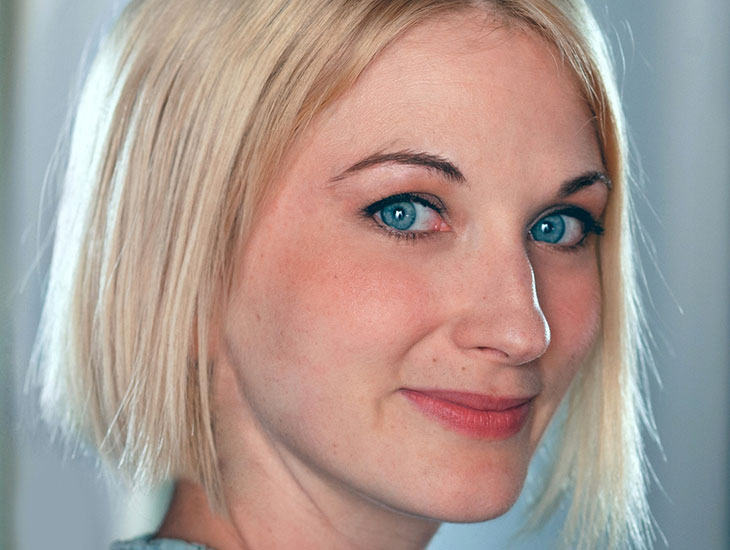Mary Tuomanen

This Exeter People profile of Mary Tuomanen ’99 first appeared on Exeter.edu in 2016. Ms. Tuomanen returns to Exeter on Friday, Oct. 29 to speak at assembly. Her remarks will be livestreamed at Exeter Live.
Activism and theater have been intertwined since Aristophanes sent the fictional Lysistrata and the women of Greece on a mission to end the Peloponnesian War in 411 B.C. Mary Tuomanen ’99 carries on that tradition, pointing to current and historical events as influential to her career both onstage and behind the scenes. A Philadelphia-based playwright, director and actor — in her words, a “theater artist” — Tuomanen has looked at issues of gender and sexuality and of race relations in her work. She’s been part of ensemble theater and solo productions and played Joan of Arc, Hamlet and, most recently, a young Andy Warhol. While it was her time at L’École Internationale de Théâtre Jacques Lecoq in Paris that helped Tuomanen understand the multidisciplinary European approach to theater and how to structure a story as writer, director and actor, she first found experiential theater — which assimilates the audience into the show — at Exeter.
Tuomanen discovered the stage during her junior year, at a time when productions historically leaned toward the classics. In response to students’ protests against more Shakespeare, then-Designer and Technical Director Cary Wendell suggested “The Persecution and Assassination of Jean-Paul Marat as Performed by the Inmates of the Asylum of Charenton Under the Direction of the Marquis de Sade.” “It was really intense, and it changed my brain, and changed me,” says Tuomanen of Marat/Sade, as it is known. “Doing that play at age 17 profoundly affected how I went on with my life.” Today, when she collaborates with her company, Applied Mechanics, or performs with ensemble troupes like the Riot Group or The Bearded Ladies, she readily finds a connection between ensemble theater and the Harkness table.
 “The director becomes the Harkness teacher, so is the facilitator — he or she brings provocations, much like a teacher would bring in a text or a question — and the group comes back with answers, either with movement or a soundscape or a scene, and the plays end up being made through a collage of those elements,” she says. Even smaller projects benefit from that approach, as when Tuomanen was struggling to write Saint Joan, Betrayed, a one-person show inspired in part by her physical resemblance to Joan of Arc (she performed it in Exeter in summer 2014 as part of a tour). She was invited to refine it at a writing residency at the Kimmel Center in Philadelphia; while there, she struggled for reasons she couldn’t immediately pinpoint. Two other playwrights in residence, Deb Margolin and Dael Orlandersmith, suggested she write instead about that resistance, and within two days, Tuomanen had created “Hello! Sadness!”, a humorous one-woman show that’s a response to societal reactions to activist women.
“The director becomes the Harkness teacher, so is the facilitator — he or she brings provocations, much like a teacher would bring in a text or a question — and the group comes back with answers, either with movement or a soundscape or a scene, and the plays end up being made through a collage of those elements,” she says. Even smaller projects benefit from that approach, as when Tuomanen was struggling to write Saint Joan, Betrayed, a one-person show inspired in part by her physical resemblance to Joan of Arc (she performed it in Exeter in summer 2014 as part of a tour). She was invited to refine it at a writing residency at the Kimmel Center in Philadelphia; while there, she struggled for reasons she couldn’t immediately pinpoint. Two other playwrights in residence, Deb Margolin and Dael Orlandersmith, suggested she write instead about that resistance, and within two days, Tuomanen had created “Hello! Sadness!”, a humorous one-woman show that’s a response to societal reactions to activist women.
Questions of Practice: Mary Tuomanen on “Timefulness” from Pew Center for Arts & Heritage on Vimeo.
“Artists and women who take leadership roles can easily be labeled ‘nuts,’ and we have so much political baggage at our disposal to use as a weapon to diminish a person,” she says, making a connection as well to race relations in the United States. Tuomanen incorporated the history of the Black Panthers, visits from poet Emily Dickinson and actress Jean Seberg, and sex workers into the show. And Joan of Arc is there, too, with Tuomanen calling her creation of a “third gender in the 15th century outrageous!”Hello! Sadness! (a title inspired by Françoise Sagan’s novel Bonjour Tristesse) is a reflection of the fight against diminishment — whether because of gender, race or sexuality — and of how difficult it can be to keep asserting oneself.
“Joan shows up and says, ‘No, I’m a third gender — I’m allowed to defy all the rules,’ ” says Tuomanen. “But France wasn’t immediately liberated. Women weren’t then allowed to become knights and wear pants, so you could argue that within her lifetime, she was a failure. Yet the important thing is to do it because it’s right — not because you know you will succeed, but because it’s the correct thing to do.”